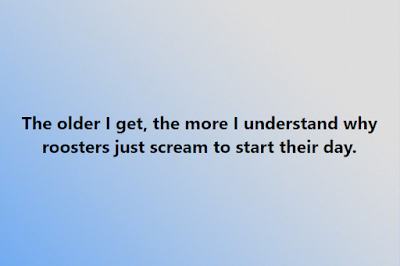Warning: Very Long Post. (But there are memes at the end.)
My late husband used to tease me about being a Yeah-But Bird.
This is what would lead to it: I would present a problem to him, and ask for his thoughts on how to solve it.
After he had dissected the problem and made his best effort at giving me good advice, I would methodically shoot down every bit of it. My sentences would always start with, "Yeah, but . . ." because I had already considered everything he said and discarded them as unworkable, which is why I was asking for his input in the first place. I was looking for some idea I hadn't thought of yet.
I'm sure it's something we could have used some marriage counselling to fix, but instead we did what most couples do and just laughed and accepted it - likely harder for him than for me, to be honest. But that was one of the things I loved about him. He loved me even when I was being a Yeah-But Bird, and a lot of other things that I shouldn't have been.
ANYWAY.
I feel like the Yeah-But Bird has resurfaced in a big way in my replies to my post about my Mom (here).
All of you had good suggestions for me, yet in my replies I realized I was pretty much Yeah-Butting every idea.
If you read all the replies, you would have the bigger picture of why I feel there is nothing I can do about the Mom situation. But if you haven't, I'll recap here:
- Mom has dementia, yes, but the bigger problem right now is her personality PLUS dementia, which leads her to refuse all help that she perceives as "help" (as opposed to just a visit initiated and desired by the guest/me)
- the public system/government services are definitely available to her, and she has been referred to them once already (in 2021) but their first requirement is that she must AGREE to have help, and she has dismissed that as unnecessary; case closed
- private care is "more likely" (quoted from the geriatric clinic) to agree to try to come into Mom's home to give assistance even if she doesn't want it, but ultimately Mom has the right to kick them out (and insult them while she's at it), which I am pretty sure she would do
- private care is the full financial responsibility of the individual receiving help (or whoever will pay for it on her behalf). Mom won't agree to have help, so I can't see her agreeing to pay for it, and it's expensive enough that my brother and I can't pay for it without jeopardizing our own financial futures.
- our efforts to get Mom to sign an Enduring Power of Attorney, as suggested by the geriatric clinic, in order for my brother and I to use her money to pay for help, fell flatter than a non-leavened pancake. Despite repeated conversations about it, Mom refused. (She is remarkably cagey for someone who cannot remember where her pies are located in the grocery store. Note: they have not been moved in years.) For those unfamiliar with an EPOA, the essence of it is that it allows a person to name one or more of what are called "Attorneys" to act on behalf of that person if he or she is incapacitated, either temporarily or permanently. If there is no EPOA and the person becomes incapacitated, the court must appoint someone to act on their behalf. The benefits of having an EPOA are that it is less expensive to have it drawn up by a lawyer than having it go through the court system, it is also faster, and you get to choose your representative instead of having one chosen for you. (None of those things swayed my mother.)
- Mom has good neighbours and a couple of understanding friends who try to keep in touch, but her neighbours already do so much for her (yard care, which I am trying to find someone to pay to do, with little luck so far, chatting with her, keeping an eye on her), and her friends have their own problems (health issues of their own or their spouses). I am reluctant to ask anyone to deal with my mother, especially if they are already doing what they can or have a significant burden of their own. There is no other family living within 1800 km of us except my two adult kids, neither of whom is in a position to help due to family and health considerations, and my brother.
- My brother lives a six-hour round trip by car from my mother and I. He has given freely of other kinds of help including financial advice (to me), doing our tax returns, mowing both our lawns, household repairs at Mom's house, and moral support for me. I am sure he would put aside his own responsibilities to come and stay with Mom for a bit if I asked him, but I see that as a last-ditch solution which would leave me feeling I had just used my emergency parachute and afterward there would be nothing at all in reserve for me to do to help myself, except . . . the next item below
- My truly, truly last-ditch solution would be to call Adult Protection Services. In order for them to take over, I was told by the geriatric clinician, I must essentially abandon my mom and all care for her. They will monitor her and they use certain markers or indicators to tell them if she is a danger to herself or others; for example, they will monitor her weight and if she loses a certain amount of weight in a certain amount of time, they take it as an indicator that she is unable to care for herself. The problem (again, told to me by the geriatric clinician) is that, in practice, a client of APS may need to lose a lot more weight in that time before the system kicks in and protects them from themselves. Similarly, putting herself in a situation that "could" be dangerous is not seen as reason enough to take someone into protection; they must have actively put themselves in danger (with witnesses) in order to have their freedom taken away.
I understand why the system protects people's independent living. I truly do. Don't we all want to have the choice of how we live as long as it's not hurting anyone else?
But there's the problem. When those who "live independently" do so only with support from those close to them (which is not truly independent living) and refuse the help of people who are paid to do it, whether that's through our taxes or by paying personally, it hurts their caregivers.
Please, Universe, make me not be like this when I get to the point I need care. Help me accept that it's time for the next chapter in my life, and that I cannot demand my freedom at the expense of the freedom of others.
I'm not relying on the Universe, though. I've already had my own EPOA drawn up, and it includes both financial and medical decisions.
Writing about this and knowing that people are listening and understanding is a huge help, for me at least. My family, my in-laws, my neighbours, Mom's neighbours, my co-workers, fellow bloggers and commenters all listen while I unload. Most of them have experience with dementia in some form, but all of them are generous with their time and kindness. I am so grateful for those people, beyond-words grateful. I also journal now, in an effort to unload less on those people, and on better days I also make a grateful list and I try to see the beauty and wonder around me, to take myself out of my headspace for even a few moments. Lately it has been a struggle to do that and I need to try harder, because it really can help.
But more and more I feel like my compassion and empathy are just drops in the bottom of a cup that is usually full but is now close to empty. It makes me dislike myself and dislike my mother. Every day, I start dreading the 8 pm visit around 4 pm, and it hangs over me like a dark cloud until it's over, at which point I feel completely empty. (I can't do the pill delivery earlier because of the timing of one of her pills.)
I know that many folks are in the same situation I'm in, or worse. Dementia is increasingly an issue in society, partly because we have cures for many diseases that wiped out people of earlier generations before they got to the point of developing dementia. And the situation will only escalate as the baby boomers like me get older and older. Capacity in nursing homes, assisted living, and independent living is failing to keep up with demand. Nursing homes in particular had an abysmal record of deaths during the pandemic (and Canada had one of the worse records, which I was shocked to find out), so families are understandably reluctant to put their loved ones in care, and trying to look after them at home. I subscribe to several Facebook accounts for caregivers - mostly caregivers of folks with dementia, and it is heartbreaking what I read there. People cannot afford to put their loved ones in care, or feel guilty doing so, and they are ruining their health and marriages and relationships with their own young children in order to look after their relatives. This is hugely detrimental to the family unit, to psychological health, to finances and job security, and to society as a whole, and when you get right down to it, it is detrimental to the patients as well. Everyone deserves to be treated with basic respect and care that allows them their dignity and a feeling of community, if they so wish it. (In some cases, people don't wish it, and that wish should be respected too.)
Well, it's been another mammoth read, so if you're still here, you really deserve more than these memes, but they're all I have to offer besides my sincere thank you.
 |
... which is now four years ago, but who's counting |





